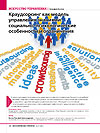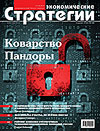Crowdsourcing as a Model of Knowledge Management: Socio-Psychological Characteristics and Limitations
The paper analyzes the crowdsourcing possibilities in predicting the future and developing solutions. The author distinguishes types of crowdsourcing, discusses its psychological characteristics in comparison with the other methods of knowledge management. He discusses cognitive and motivational mechanisms limiting the effectiveness of crowdsourcing as a form of collective intelligence.








